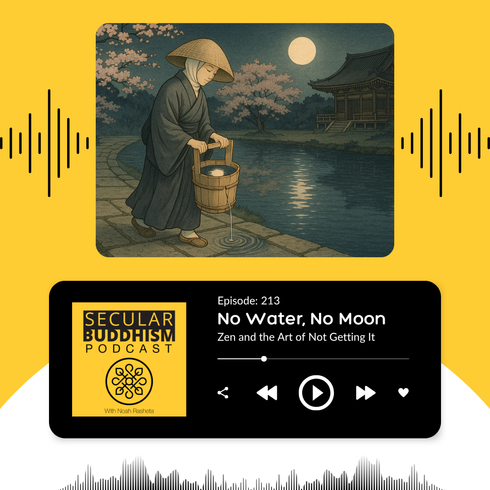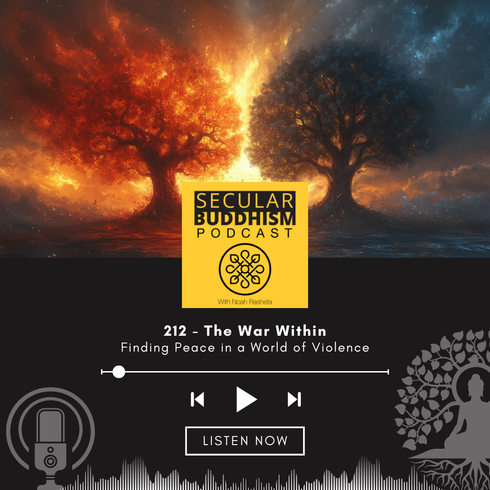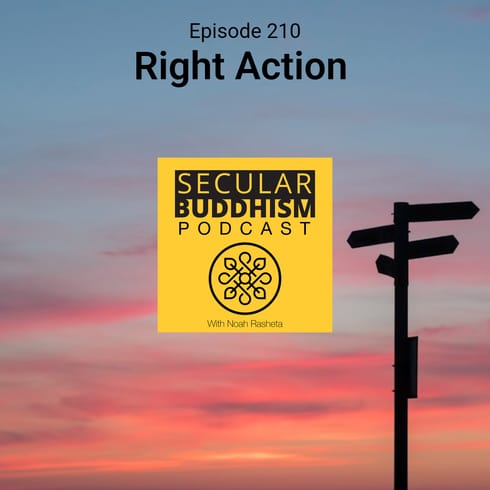The ultimate authority in your life is YOU. If you’re familiar with the Kalama Sutta, you’re aware of the teaching to analyze things against your own experience and to be cautious about relying on external sources for authority. Knowing this, why do we still care so much about external authority? In this podcast episode, I will talk about the idea of ultimate authority.
Subscribe to the podcast on:
iTunes – https://itunes.apple.com/us/podcast/secular-buddhism/id1071578260
SoundCloud – https://soundcloud.com/secularbuddhism
TuneIn – http://tunein.com/radio/Secular-Buddhism-p823114/
Stitcher – http://www.stitcher.com/s?fid=80132&refid=stpr
Transcript:
[
00:00] Hello and welcome to another episode of The Secular Buddhism Podcast. This is Episode Number 90. I am your host, Noah Rasheta, and today I’m talking about the ultimate authority.
[
00:12] I think this is an interesting topic to bring up because I usually start the podcast with this snippet of advice where I say keep in mind the Dalai Lama’s advice to not use what you learn from Buddhism to be a Buddhist, use it to be a better what already you are. I’ve mentioned this quote roughly 90 times, once per episode, and I’ve mentioned it on several different occasions. It was recently brought to my attention that this isn’t actually a verifiable quote by the Dalai Lama. I did a little investigating and research and someone shared some links to some articles and when I first heard this, I came across this quote while reading a book by Gerald Benedict. He has it quoted in his book, a book called
Buddhist Wisdom
, and it has the phrase just like I’ve always used it with the quotations.
[
01:13] Naturally I assumed if it’s in a book and it’s got quotes, it’s the right quote and that if you search for it online you’ll find the same thing. Dozens of people have used this quote, including myself and including Robert Wright in his book
Why Buddhism is True
. A lot of us have used this quote because we really like the message, but apparently the actual quote can’t be found anywhere. It does look like there is a source for where this quote to this thought originated and that’s from a book called
Amazing Grace
by Kathleen Norris, and in that book it’s relating an interfaith dialogue that happened a few years before she wrote the book. Here’s how it’s worded, I’ll read it to you.
[
02:01] This is coming from her book where she’s saying, quote, “A young man I know was stunned when he went to Thailand and tried to join a Buddhist monastery. ‘Go back home and become a Christian monk first’, they told him, ‘Learn your own tradition.’ At a interreligious conference of Buddhist and Christian monastics held not long ago at a Trappist monastery, a reporter asked the Dalai Lama what he would say to Americans who want to become Buddhists, and his reply was, ‘Don’t bother’, he said. ‘Learn from Buddhism if that is good for you, but do it as a Christian, a Jew, or whatever you are and be a good friend to us.'” Closed quote.
[
02:43] All of that comes from Kathleen Norris’ book, so it seems logical that what happened is somebody read this and then took the context of the implication of what was being discussed here, cleaned it up into a quote that we’ve all heard now which is, “Don’t become a Buddhist” … Or, “Don’t try to use what you learn from Buddhism to be a Buddhist, use it to be a better whatever you already are.” Yes, that is the essence of what’s being shared, but no, that’s not the exact quote.
[
03:14] I thought it was really fascinating to encounter this information and to realize, “Wow, if we’re living in a day and age where the Dalai Lama is still alive, it shouldn’t be difficult to have quotes verified when they’re attributed to him in the technology age that we live in”, and yet here we are and look how easy an idea … Which I must admit, I think the idea is still accurate in what’s being depicted, but it’s no longer … It’s not accurate to depict it as an exact word-for-word quote. That’s what I’ve done and a lot of us have done. What I thought when I encountered all of this is, “Man, if we do this today in this day and age with someone who’s still alive like the Dalai Lama, what hope do we have of trusting anything that was written long ago and attributed to someone like the Buddha?”
[
04:11] On the Fake Buddha Quotes site it has this quote. I’m sure some of you have heard this, but it says, “Believe nothing, no matter where you read it or who said it. No matter if I have said it, unless it agrees with your own reason and your own common sense.” This is a quote often attributed to the Buddha, and again, there’s no verifiable source that that is a Buddha quote or a quote by the Buddha.
[
04:36] Now, there is the Kalama Sutta, and I’ve quoted from there in the past that you can read on Access to Insight and the actual translation that they use for the Kalama Sutta says, “Now, Kalamas, don’t go by reports, by legends, by traditions, by Scripture, by logical conjecture, by inference, by analogies, by agreement through pondering views, by probability, or by the thought. This contemplative is our teacher. When you know for yourselves that these qualities are skillful, these qualities are blameless, these qualities are praised by the wise, these qualities when carried out lead to welfare and to happiness, then you should enter and remain of them.”
[
05:19] Now, so the gist of what’s being said in that quote in the actual translation does imply this idea of don’t believe something just because you read it somewhere. The sentiment translates, the exact words don’t. Now, here’s the irony for me. Even if you take the translated text that is supposedly the authority, you’re still stuck with the problem of, how do we know that was even translated properly? Anybody who speaks two languages knows that you can take an idea and a concept and translate from one language to another and if you do it based on the words, you’re not gonna get the … Generally, you won’t get the right meaning. If you do it based on the right meaning or trying to teach the … Trying to convey the message, you may use the wrong words.
[
06:08] I experience that all the time. I speak English and Spanish and I encounter this just in my day-to-day communication trying to take one idea from one language to another. Well, imagine the teachings that we’re reading that come from any source of Buddhist Scriptures or any form of teachings, these are all translations of translations of translations and often times before they were ever written down, they were conveyed from person to person to person as oral traditions, as stories.
[
06:41] This is why I’m generally really cautious to share something and say, “Oh, here’s what the Buddha taught”, because how on Earth could we know? All we know is what someone says that someone says the Buddha taught. How many renditions of that have been tweaked by someone trying to clarify what they believe the previous person sharing it probably meant? Even if it’s with good intent, you’re still stuck with a general idea that maybe did make it over, but definitely not word for word or an original to any of the teachings of the Buddha and probably any of his early followers.
[
07:22] With that said, what I wanted to get at in this specific podcast episode is this topic of authority. I think realizing this about the quotes I think it’s a fascinating moment to bring up what I think is a very common way of thinking in Buddhism, which is, “Well, where does this authority come from?” If you read something and you agree with it, do you believe it because someone wrote it? The whole sentiment of the Dalai Lama’s quote, most of us who read that and like it, we like it because the Dalai Lama said it.
[
07:59] What if we had been using that quote and it was like, “Who said this? Joe Schmoe who lives on the corner.” We’d be like, “Oh, I don’t know then. If Joe Schmoe said it, I don’t know.” If the Dalai Lama said it, “Oh, okay, now I’m paying a little bit more attention.” Isn’t it interesting that we do that? The words seem to be more powerful or more important depending on who said them. This is the irony. I think Buddhism would want to flip that on us and say, “Why are we doing that? Why are we thinking that there’s any more power to what the sentiment of the quote is just because we thought it was said by the Dalai Lama rather than someone else?”
[
08:41] This has had me thinking for days now how natural it is for us to do this, to want to seek to some form of authority. It’s an easy thing to do because then I don’t have to spend the time to be introspective and decide, how does this work for me? I can just go off of the authority of, “Well, I trust that he knows what he’s doing, so if he says it, then I’m good.” I encounter this all the time when I’m talking about Buddhist teachings and concepts. People will always want to follow up, either by email or in a workshop or something with, “Well, what does Buddhism say about this? Or what does Buddhism … What does it do about this or that?” I always find that interesting that there’s this appeal to authority. It’s like, “Hey, tell me what I should be doing if I want to do this the right way, the Buddhist way.”
[
09:34] If you browse on the internet, you’ll find countless articles that kind of do the same thing. The Buddhist approach to this, or the Buddhist understanding of this or that. It’s like, first of all, there isn’t a Buddhist approach to this or to that because there’s no single collective Buddhism, so that’s something to keep in mind. The second one, I’ve mentioned this before, is why would we want to appeal to some authority … Whether it be the Buddha or the Dalai Lama or somebody who speaks on behalf of Buddhism … To tell us, “Oh, this is how it is?” “Okay, well, now that you said that, I’m gonna go off of that.”
[
10:15] Authority comes from within, it comes from us. I think this is the radical realization that the Buddha had at the moment of enlightenment according to how I understand all these stories when I hear about them and read them. The Buddha had this moment where he realized he was the source of it all. He was the source of the authority, and we can have that same experience. Suddenly to have that moment of realization that what I think, what I say, and what I do, that’s the only thing that matters to me. Suddenly I don’t need to depend on, “Well, what would the Buddha say? What would the Buddha do?” It becomes more about, “What would I do? What would I say? Why am I saying this? Why am I thinking this? Why am I doing this?” You are the ultimate source of authority.
[
11:06] Now, when I first started exploring this concept of I guess you could say trusting yourself, for me to try to trust myself … The way this unfolded for me, I was a theistic believer and I remember suddenly thinking, “Well, wait. How do I know there’s a God?” Well, because I trust the people who told me that there’s a God. That made me realize, “Well, then who do I really have faith in? I don’t have faith in God, I have faith in the people who have told me about God.” I continued to explore that line of thought and I realized, “No, I don’t have faith in them, either, I have faith in myself for … In my ability to trust that what these people are saying is true.” Ultimately, it all came back to me again. It’s like, “I have faith in myself and my ability to discern that these people are speaking truth and I trust them and therefore what they say is true, which is there is a God and this is what that God wants of you.”
[
12:08] That became a problematic thought for me in my head. I thought, “Well, wait a second. There’s nothing noble in that. All it is is I trust myself so well that for me to tell myself that, ‘Yes, these guys are telling me the truth’, that’s me trusting me. How is that anything more than that?” That line of thought kind of became problematic and that’s part of what started my transition away from wanting to believe in some form of external agent that was acting upon me for good or for bad. I thought, “Well, if all of this stems from trusting myself anyway, why not find a tradition that focuses on that aspect of it? The ability to look inward and to trust myself?” That’s kind of the turmoil that I went through as I was going through a transition in my belief and in my faith.
[
13:09] I just wanted to turn inward and say, “Well, why do I trust the things that I trust? Why do I believe the things that I believe?” That form or introspection worked really well with Buddhism and with the approach that Buddhism takes to a lot of these concepts where it’s not about an external source, it’s all about understanding yourself. I think this is a good time to emphasize that again, that this path … The path of being more mindful and the path of becoming the better whatever you are implies that this is you and there’s no one else responsible for any of this.
[
13:48] The ultimate authority in your journey of self-understanding, of enlightenment, whatever you want to call this, it’s you. You are the ultimate source. Nobody can come and tell you, “Hey, here’s the truth.” I mean, they could, but there’s no … That does nothing for you. What does everything for you is you understanding you and understanding why you believe the things you believe, why you don’t believe the things you don’t believe. Why you say the things you say and do the things you do and on and on and on. Where you become the ultimate authority.
[
14:26] In future podcast episodes, I’ll probably still reference this sentiment, not quite as this quote. I’m gonna kind of rethink it and rephrase it. You’ll probably hear it in future podcast episodes as, “Keep in mind the advice to blah, blah, blah.” I don’t know how I’m gonna work with this, I just … I don’t want to convey that this is a quote when it is not, but I do think it’s appropriate to say, “Keep in mind the Dalai Lama’s advice that we don’t need to become Buddhists.” He said, “You can be a Christian, you can be a Jew, you can become a … You can be whatever you are and still benefit from these teachings. The teachings that come from Buddhism.”
[
15:08] I think, again, the advice is still spot on. I really enjoy everything that’s conveyed in that message and I would still certainly stick to that with everything that we talked about here in this podcast, but I did want to at least make you aware that that is not a word-for-word quote and furthermore, hopefully that makes you even more skeptical of anything that anyone’s gonna tell you is a quote. Even if they do and you think, “Oh, I really like that, especially because so and so said it”, that’s a really good opportunity to pause and say, “Why does it matter so much to me that so and so said it?” Whoever that so and so is, the Buddha, Jesus, whatever your authority goes to. Ask yourself, why does that matter so much? Why does the authority have to go there when I understand that I am the ultimate source of my authority? You’re the one that decides what you believe and that gives you the ultimate power.
[
16:06] That’s what I wanted to discuss in this short podcast episode, the ultimate authority. It’s you and hopefully as you continue to learn and listen to and hear about Buddhist teachings and concepts, keep in mind that at the end of the day, none of this means anything if it doesn’t mean something to you. If it doesn’t do something to help you understand you, yourself better. That’s what I wanted to share.
[
16:33] Again, if you want to learn more about Buddhism and mindfulness, you can always check out my books, Secular Buddhism, No Nonsense Buddhism For Beginners, and The 5-Minute Mindfulness Journal. Those are all three available on noahrasheta.com. If you enjoyed this podcast episode, feel free to share it with others. Write a review, give it a rating on iTunes. You can always join the online community, secularbuddhism.com/community. If you want to make a donation to support the work I’m doing with the podcast you can visit secularbuddhism.com and click the “Donate” button. That’s all I have for now, but I look forward to recording another podcast episode soon.
[
17:13] Thank you and until next time.




